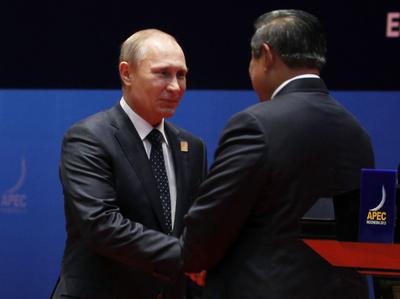But it is much less clear why Vladimir Putin chose not to go to Brunei, especially given that just two days prior to the EAS the Russian president attended the APEC Leaders’ events in Bali — and even celebrated his 61st birthday there.
It is striking that the Russian president failed to take part in the EAS for a third time running. Just a few years ago Moscow had vigorously sought membership in the grouping and was finally invited to join the EAS in 2010 as a full participant, along with the United States. Yet, although the EAS calls for the attendance of heads of state or government, Russia has never been represented at the highest level. In 2011 then-president Dmitri Medvedev did not attend the EAS held in Bali; in 2012 Putin chose not to travel to Phnom Penh, Cambodia. And now Russia has another no-show: its representation was lowered to the level of foreign minister, a post held by Sergey Lavrov.
It should come as no surprise that another non-appearance by the Russian leader has caused some resentment among ASEAN countries, which view themselves as the driving force behind the EAS. According to a Southeast Asian diplomat, Putin’s absence ‘just reflects how Russia looks at ASEAN — that it doesn’t give much weight to ASEAN’.
To be sure, Putin’s failure to attend the annual EAS meetings contradicts multiple policy statements by the Kremlin itself, which identifies the Asia Pacific as a major priority for Russian foreign policy. However, Russia’s reduced representation at the EAS does make some sense. The EAS has gained a status as the Asia Pacific’s most important multilateral venue for discussing security issues. But for the moment there are no security problems in the Asia Pacific that pose a direct and significant threat to Russia, at least in the short to medium term. Moreover, Russia has relatively little political and military leverage over the region’s strategic situation. Given this is the case, why would Putin spend precious time attending a gathering overseas, while he has to deal with a whole spread of pressing problems at home?
Intentionally or inadvertently, through its reduced representation Russia is sending a signal that it is not (yet?) willing to play a pro-active strategic role in the Asia Pacific. One reason for this reluctance is that, unlike in Europe, Central Asia or, to some extent, the Middle East, Moscow has no post-imperial spheres of influence in the Asia Pacific that it must fight for. Russia’s chief interest in the region lies in economics rather than security. Incidentally, that may be why Putin (as well as Medvedev during his presidential tenure) has not missed a single APEC summit, the Asia Pacific’s main economic forum. The only exception is the APEC Leaders’ meeting in Los Cabos, Mexico, in 2002, which Putin did not attend due to a massive terrorist attack in Moscow.
Another element to bear in mind is that the EAS agenda now includes the South China Sea dispute as one of its top items. Without a direct stake in the South China Sea, Moscow is clearly not interested in backing any one party. If it did, it would risk spoiling relations with the other contending parties. China and Vietnam, two of the main claimants, are both Russia’s avowed ‘strategic partners’. The wisest course of action, then, is to pursue diplomatic neutrality. For this, Russia’s decision to send its foreign minister appears to be a smart option, especially given that Lavrov is such a skilful diplomat.
The Kremlin’s treatment of the EAS reflects Russia’s broader strategy in the Asia Pacific, which is in effect not to take sides in the unfolding competition for primacy between China and the United States. On the one hand, Moscow and Beijing have jointly promoted their vision for an ‘open and non-bloc security system’ in the Asia Pacific, in thinly veiled opposition to the US-centred hub-and-spokes architecture, and hold military drills together in Pacific waters. On the other hand, Russia refuses to support China’s assertive stance in its disputes with Southeast Asian countries and Japan. It remains to be seen for how long, and how successfully, Russia will be able to maintain this strategic neutrality.
Artyom Lukin is Associate Professor of International Relations and Deputy Director for Research at the School of Regional and International Studies, Far Eastern Federal University, Russia.

